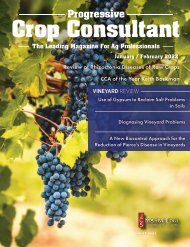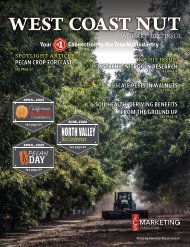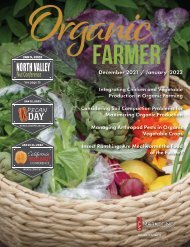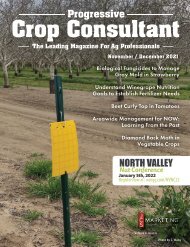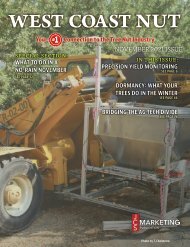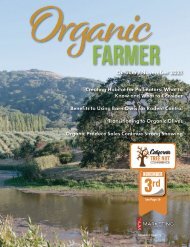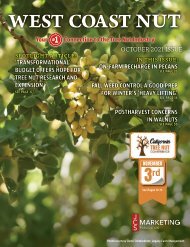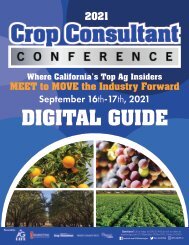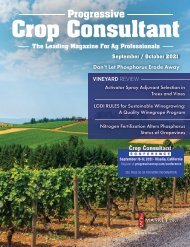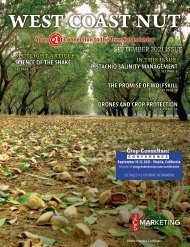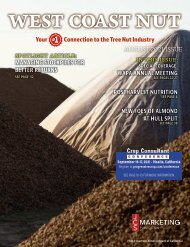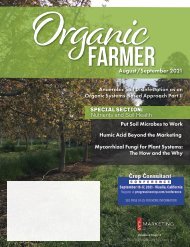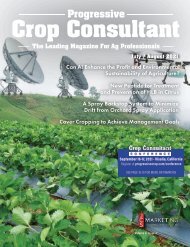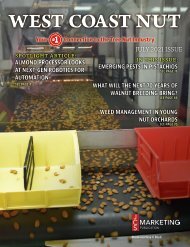WCN Dec e
Create successful ePaper yourself
Turn your PDF publications into a flip-book with our unique Google optimized e-Paper software.
Grower-Cooperators a Vital Cog in Research<br />
Growers provide an invaluable service for university and USDA<br />
researchers as well as for their respective industries.<br />
By MITCH LIES | Contributing Writer<br />
Cliff Beumel of Agromillora Nursery spreads chips in a walnut orchard as part of a whole orchard recycling trial at the farm of Sutter County<br />
grower-cooperator Mat Conant. Grower-cooperators like Conant are vital to the success of research, according to UCCE Farm Advisor<br />
Luke Milliron (photo by L. Milliron.)<br />
For the past three years, walnut harvest has taken a<br />
little longer on one block of Jerry Moore’s Visalia, Calif.<br />
farm. There are no weather issues or equipment malfunctions<br />
slowing harvest. Moore has volunteered the block to<br />
UCCE for research into solving a nematode problem that has<br />
plagued walnut growers for decades.<br />
Moore receives no compensation for the extra time it takes<br />
as UCCE researchers test and weigh walnuts after each row is<br />
harvested. But he rests easy knowing that he is helping growers<br />
across the state who have lost yield to nematodes.<br />
“What I get out of it is the gratification of knowing we are<br />
helping the industry,” Moore said. “If they can come up with<br />
something to solve the nematode problem, it will be a big help<br />
to the industry.”<br />
According to researchers, growers like Moore provide an<br />
invaluable service for university and USDA researchers as well<br />
as for their respective industries.<br />
“We could not be successful farm advisors without grower-cooperators,”<br />
said Luke Milliron, UCCE farm advisor<br />
for Butte, Glenn and Tehama counties. “There is just no way<br />
around it.”<br />
Milliron added that he is fortunate to be centered near a research<br />
farm, in his case the Chico State University Farm, where<br />
he can conduct certain projects. “But you really need to do<br />
this research on different types of ground, with different pests<br />
and disease pressure,” he said, “and the only way to find those<br />
MYERS BROS.<br />
WELL DRILLING, INC.<br />
• Agriculture<br />
• Commercial<br />
• Municipal<br />
8650 E. Lacey Blvd<br />
PO Box 1283<br />
Hanford, Ca 93232<br />
• Test Hole<br />
• Well Abandonment<br />
• Well Rehab.<br />
Lic. #548214<br />
myersbroswelldrilling.com<br />
Serving the Central Valley for 60 Years<br />
types of situations is to have these grower-cooperators that are<br />
willing to put up with inconvenience and potential loss in some<br />
profits by letting you have rootstock blocks and test different<br />
materials in their orchards.”<br />
Joe Grant, research director for the California Walnut<br />
Board and UCCE farm advisor emeritus, said in many cases,<br />
research has to be conducted on-campus or on university field<br />
stations. Spraying unregistered pesticides, for example, can’t be<br />
conducted on a commercial farm without having to destroy the<br />
treated crop. And some research, like evaluating the performance<br />
of new varieties and rootstocks, isn’t generally conducive<br />
to a grower-cooperator situation.<br />
“No grower is going to want to put up with devoting a lot of<br />
space to wait 10 to 12 years for a variety to get evaluated,” he<br />
said.<br />
Conversely, Grant said, many research projects can and, in<br />
some cases, need to be done in the field.<br />
Pat Brown, UC Davis walnut breeder, noted, for example,<br />
that much of his initial breeding work takes place on campus.<br />
“But,” he said, “once we are pretty sure that something looks<br />
good, we need growers across the state to trial it before we<br />
release it. That is a key step in putting out new varieties.”<br />
Grant agreed. “It allows researchers to test things in a much<br />
broader variety of settings and management styles than we<br />
could ever do on campus. So, that is very valuable. It is a quicker<br />
route to ultimate successful adoption when you can get a new<br />
technique or new variety or new rootstock looked at across a<br />
broad range of conditions.”<br />
Give and Take<br />
Grower-cooperators typically reap some benefit from<br />
participating in research, according to growers and researchers.<br />
Many like being on the cutting edge of new advances and<br />
seeing them at work on their farm, Grant said. But they also<br />
encounter inconveniences in working with researchers, and it<br />
can be a financial burden.<br />
“The grower usually ends up sacrificing something, whether<br />
it be yield, profit, convenience or time,” Grant said. “But I think<br />
Continued on Page 66<br />
64 West Coast Nut <strong>Dec</strong>ember 2021




